Access to capital and lending are likely to be more stringent as businesses are adversely impacted in this coronavirus era, accounting and auditing firm Deloitte has forecast.
It, however, says companies with in-built resilience will have the advantage in accessing capital.
In its analysis of "COVID-19 – Potential implications on Banking and Capital Markets Managing the financial and business impacts", Deloitte said there is an increased probability of loan default as other businesses experience financial distress as a result of COVID-19.
"A sharp drop in interest rates and increased volatility in securities and Foreign Exchange (FX) prices increase banks’ market risk, potentially leading to losses", it pointed out.
Currently, increased volatility and decline in prices across many asset classes have impacted the trading books and increased market risk as well as counterparty credit risk.
The international accounting firm said recent market stress may put liquidity pressure on banks and capital market firms, which may affect dividend payments and share buybacks.
"If operating models of banks and capital market firms needs to change, it may become difficult for the Board of to continue to meet governance obligations."
Credit analysis
As at 31 December 2019, the credit portfolio of the banking industry comprised private enterprises credit (63.8%), household credit (20.8%) and public sector credit (15.4%).
Credit to indigenous enterprises was the largest component of private sector credit, accounting for 55.4 % of total credit at December 2019 while foreign companies were allocated 8.4% of total credit from the banking sector, summing up to the 63.8% share allocated to private enterprises.
With a significant portion of credits to indigenous private enterprises, Deloitte said any disruption of economic activities resulting from COVID-19 will expose banks to credit risk.
Credit risk exposure
In terms of credit distribution, the service sector had the highest share of credit (24.1%) as at December 2019 followed by the commerce and finance sector (20.9%).
The third largest recipient of credit was the manufacturing sector which received 10.9% of the total credit issued by banks in Ghana. These sectors also recorded high Non-Performing Loans (“NPLs”) as at December 2019.
The commerce & finance industry accounted for the highest proportion of NPLs at 26.2% while the service and manufacturing industries respectively accounted for 16.9% and 13.4% of the industry’s NPLs as at December 2019.
Giving that these industries are being hit the hardest by COVID-19, Deloitte pointed out that the NPL situation is likely to worsen in these industries in the coming months.
Click to view details



Business News of Thursday, 28 May 2020
Source: classfmonline.com

















